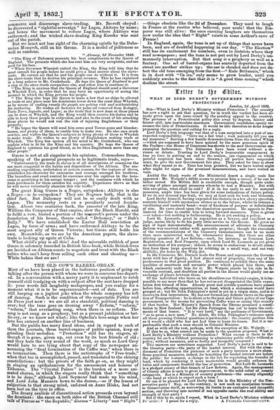IRE OLD COW'S BARREL-ORGAN.
Mon of us have been placed in the ludicrous position of going on talking after the person with whom we were in converse has depart- ed. In a conversation with a merry party it is unpleasant to catch yourself still trudging on with a subject after the rest have dropped xt: your words fall laughably malapropos, and of realize for a moment what it is to be superannuated—out of date. You are still harping on a jogtrot joke when the whole company has left off dancing. Such is the condition of the respectable Public and its Press just now : we are all at a standstill, political dancing is ever; but the tune goes on droning away "Reform," "reform," "reform," that everlasting song, when there is no reform. The song is not sung as a prophecy, but as a present jubilation or bat- tle-cry, or we know not what ; like Ophelia'a love-songs when her Jove has entered on another line of business.
But the public has many fixed ideas, and in regard to each of them the journals, those barrel-organs of public opinion, keep on grinding their melodies. " Protection " still has its singers, al- though it is gone, given up, out even by its best friends of old ; and they hate the very sound of the word, as much as Lord. Grey Would hate to see lying about that copy of the newspaper an- nouncing the "final termination of the Caffre wax," when there is no termination. Then there is the antistrophe of "Free-trade," when that too is accomplished, passed, and translated to the shining constellations : but the priests of the faith go on, as they might P1 singing an epithalamium for the amusement and honour of Tithonus. The "Crystal Palace" is the burden of a more ani- mated chorus, in which the singers really think that "something is to be done," although Lord Seymour had made up his mind, and Lord John Manners bows to the decree —as if the lesson of subjection to that strong mind, enforced on Anne Hicks, had not been lost on the tyro in office. The dreary canticle of discontinued action proceeds even beyond the frontiers : the races on both sides of the British Channel still talk of France as " the Republic," discuss " Liberty" anti " Right" —things obsolete like the 2d of December. They used to laugh in France at the rustics who believed, poor souls ! that the Em- peror was still alive-: the once cunning laughers are themselves now under the idea that" Right" exists in some Arthur's cave of I France ! I In England, again, the tune is set up of things that never have been, and are of doubtful happening in our day. "The Election" still has its excitement for numbers, even in districts where they read newspapers ; and the tune is not put out by Lord Derby's nu., mannerly interruption. But that song is a prophecy as well as a fantasy. One set of barrel-organs has scarcely departed from the street ere another strikes up ; the ear is cheated and does not de- tect the old tune emerging from the first—" Rule Britannia," which is in duet with "Ca ira," only seems to grow louder, until you suddenly awake to the fact that it is "A good time coming" which deafens the street.


























 Previous page
Previous page